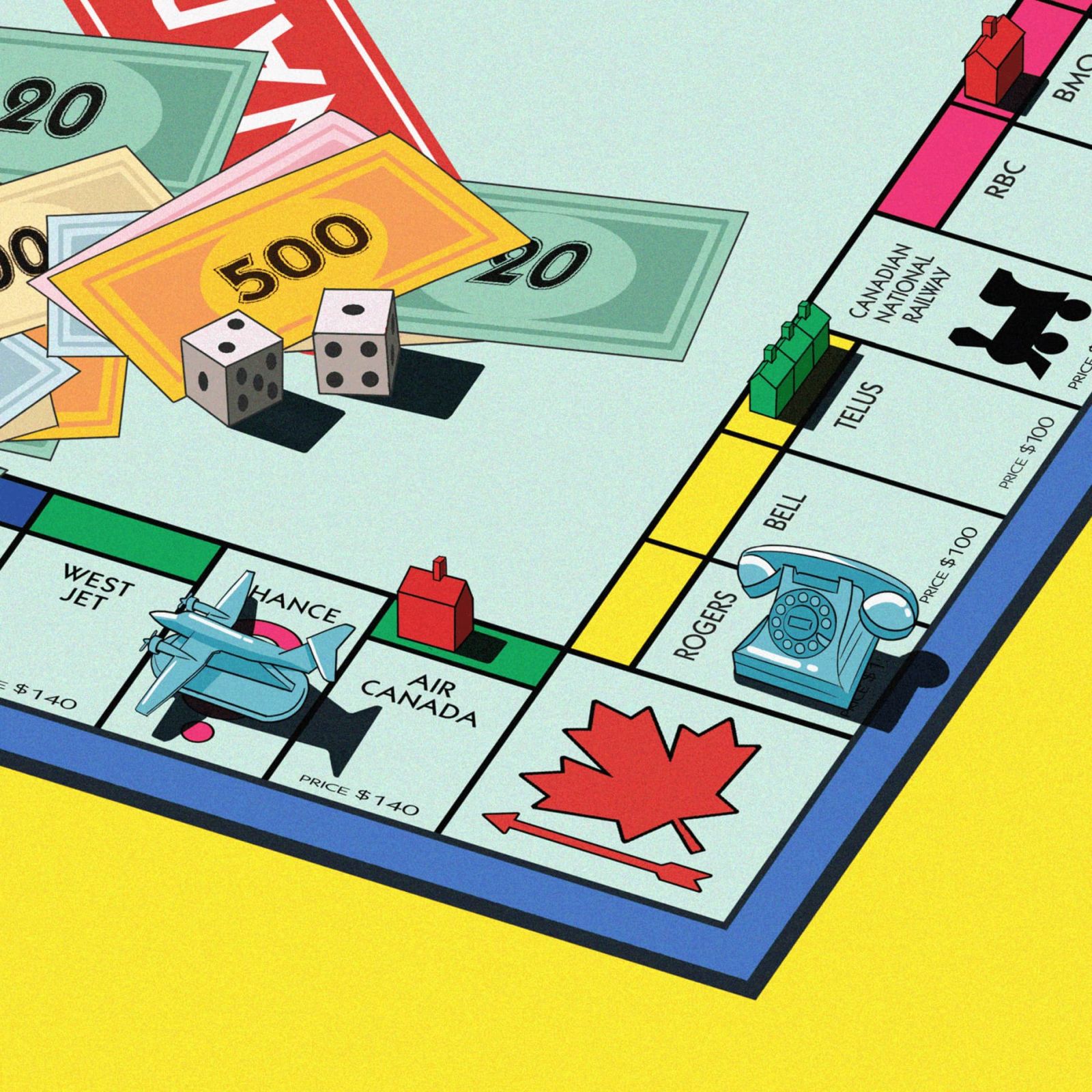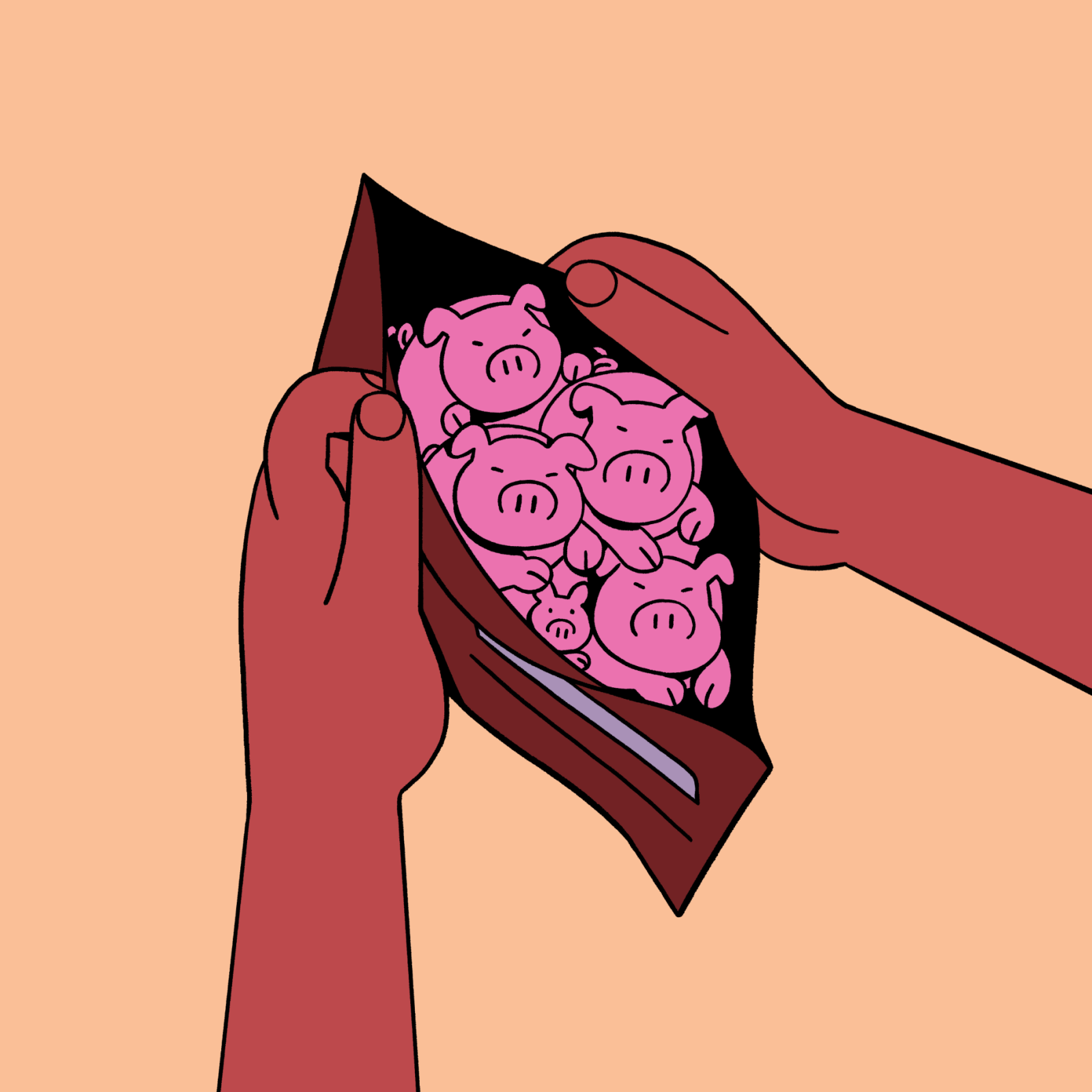
Money & the World
Everyone Knows Canadian Monopolies Are a Problem. Why Can’t We Do Anything About It?
If you thought a regular Monopoly game was long and boring, Canada’s been playing its own version for, oh, 200 years. The host of the Canadaland podcast “Commons” explains how we got here, how limited competition hurts everyone, and what we can do about it.
Wealthsimple makes powerful financial tools to help you grow and manage your money. Learn more
Note: This story first ran in TLDR, Wealthsimple’s weekly non-boring newsletter.
Canadians are all too familiar with the illusion of choice. WestJet or Air Canada? Loblaws or Sobeys? The Big Five banks? Even 63% of our beer comes from two multinational behemoths. The telecom industry, considered one of Canada’s most egregious oligopolies, will likely consolidate further, with the Rogers and Shaw merger that’s expected to go through any day. The deal has sparked heaps of controversy, at least partially because the companies have exploited weaknesses in Canada’s anti-monopoly law*, the Competition Act, to push through a deal. TLDR’s Sarah Rieger talked with Arshy Mann, of the Canadaland podcast Commons — whose latest season focused on monopolies — about how a few companies came to dominate Canada, and why that hurts the rest of us.

Sign up for our weekly non-boring newsletter about money, markets, and more. Sorry, TLDR is currently available in English only.
By providing your email, you are consenting to receive communications from Wealthsimple Media Inc. Visit our Privacy Policy for more info, or contact us at privacy@wealthsimple.com or 80 Spadina Ave., Toronto, ON.
What sort of problems do monopolies create in Canada? Like, does it really matter that we only have one major movie-theatre chain or one blueberry producer? For one, customers tend to get worse, more-expensive products because of the lack of competition. Almost every other country in the world pays less than we do for cell service, for instance. The same goes for groceries. Monopolies hurt workers, too, since they have fewer employment options. That results in lower wages and worse working conditions.
[One economist calculated that in 2019, oligopolies lowered the economic wellbeing of U.S. consumers and companies by 11.5%; comparable data for Canada isn’t readily available, unfortunately.]
Go on… Well, monopolies also lead to a lack of research investment, because why not just shuffle all your profits into dividends when competition is so limited? And monopolies just make people feel really disempowered — like, no matter how we vote we can’t make a difference, because these incredibly connected corporations exert so much sway over our politics.
Canada has always feared that if we don’t let our homegrown companies get huge, we’ll get swamped by American competitors.
Why does Canada produce so many monopolies in the first place? Canada was, in a lot of ways, built on monopolies — think about the Hudson’s Bay Company or Canadian Pacific Rail. Canada has always feared that if we don’t let our homegrown companies get huge, we’ll get swamped by American competitors. That’s why there’s a tension between Canadian politicians, who often say they’re pro-competition, and the law, which incentivizes consolidation.
Explain that: how does the law encourage consolidation? Isn’t the Competition Bureau supposed to step in? I spoke to Competition Commissioner Matthew Boswell, and he was really frank. He said, Look, our laws are not adequate. He doesn’t have enough power in his role to do the things Canadians expect him to do, because of some incredible legal loopholes that no other major developed nation has when it comes to competition. One is the efficiencies defence, which basically allows a merger to go through if it will benefit shareholders. It doesn’t matter if consumers get screwed over.
Well, is there any evidence that allowing Canadian corporations to balloon better positions them against U.S. competitors? Not in my view. When you coddle companies, they actually become less competitive abroad because they’re not forced to innovate or improve their services. That’s why we don’t see Rogers or Telus out there competing with Verizon or AT&T. There’s something to be said for protecting your domestic industries when you’re a developing country. Japan and South Korea demonstrated that in the ’60s and ’70s. But we’re not in that position.
When you coddle companies, they actually become less competitive abroad because they’re not forced to innovate or improve their services.
Can you give me another example of how coddling — to use your word — companies has backfired? Look at shipbuilding: Stephen Harper’s government launched a strategy in 2010 to develop the industry, and a lot of the contracts went to the ur-monopolies of Canada, like the Irvings in New Brunswick. Well, the plan called for spending $26 billion on 15 warships. Now the cost has risen to more than $80 billion, and not one ship has been delivered yet. The Globe and Mail’s Andrew Coyne recently pointed out that the country could have purchased comparable ships from U.S. firms for a third of the cost.
Is there anything good about Canada’s overabundance of monopolies? I did change my mind on one thing — agriculture supply management. I had the same biases that almost every Canadian has: that supply management is the worst thing because it means higher prices. Yes, it’s like a cartel! And they hold enormous political power. But at least they’ve made sure small producers haven’t been run out of business, and they balance the needs of consumers and producers.
The U.S. is trying to crack down on monopolies. Is Canada trying to do anything along similar lines? The Liberal government has promised to review the Competition Act [which aims to prevent anti-competitive behaviour]. But the government appears as if it’s going to let one of the biggest mergers of the decade — Rogers–Shaw — go through first. Which, to me, feels like a corrupt bargain. That said, while I’m pessimistic about a lot of things, I think the monopoly problem is one of the easier things we, as a nation, can fix — small changes in the law can make a big difference. Conscious political choices in Canada allowed monopolies to dominate. We have the capacity to change the status quo. We don’t have to say, Well, this is just the way it is. ♦
This interview was edited for length and clarity.
*Okay, yes, some of the industries we talk about here are duopolies or oligopolies, but we're largely going to use monopoly to avoid overloading you with -opolies.
________________________________________________________________
Wealthsimple Favourites
“My Finances, in Brief,” an Essay by David Sedaris
Karen Russell on writing, money, and motherhood
“The Code That Controls Your Money,” by Clive Thompson
Sarah Rieger is a news writer for Wealthsimple Magazine. She was previously a staff writer and editor at CBC News and HuffPost Canada. You can reach her at srieger@wealthsimple.com, or on Twitter at @sarahcrgr.





